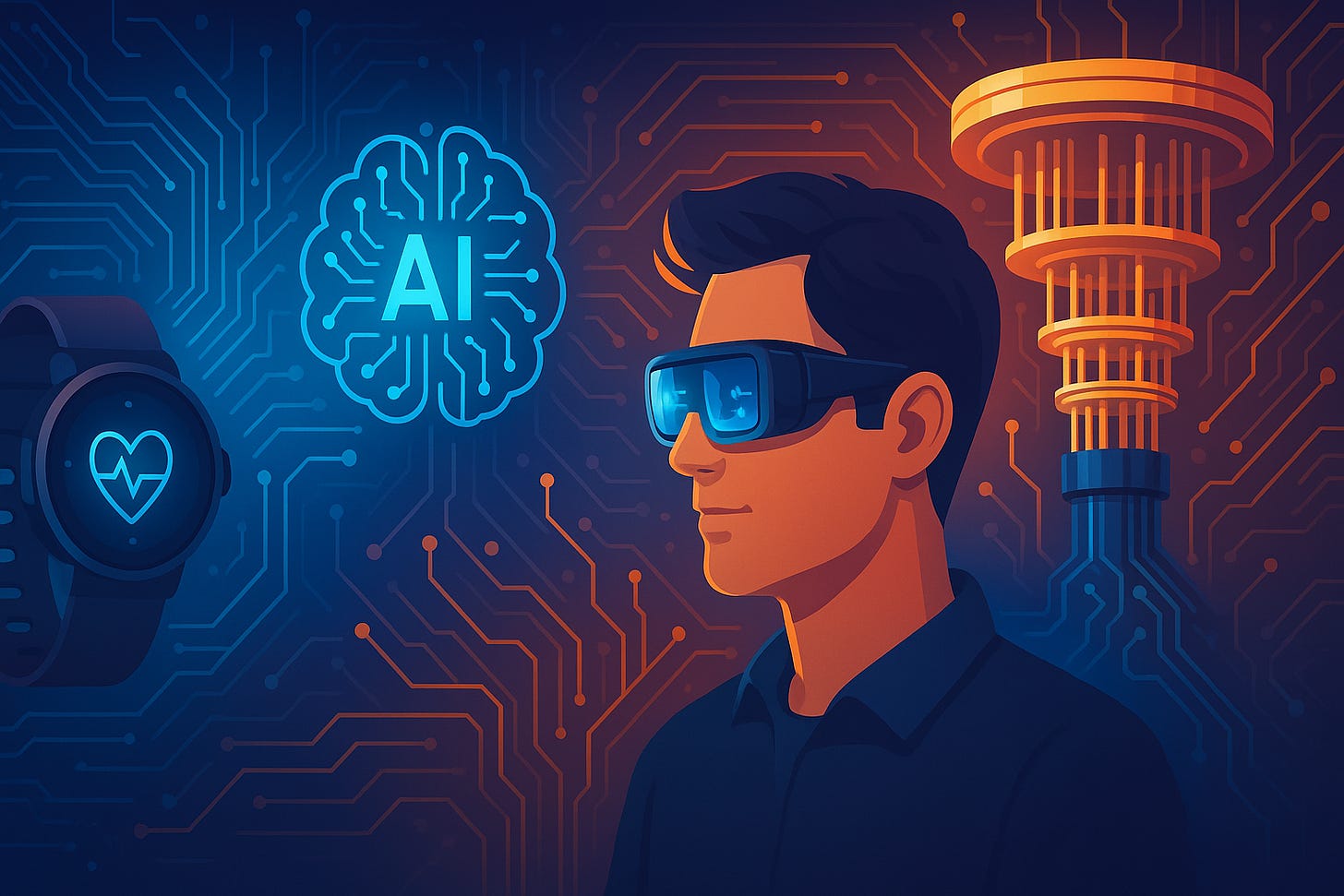The Trifecta: Devices, Algorithms, and Quantum Computing Converge
We're witnessing an unprecedented technological convergence that will fundamentally reshaping how AI learns, how we are interacting with digital intelligence, and ultimately, how human behavior will evolve. The intersection of three critical advancements—quantum computing breakthroughs, ubiquitous smart devices, and algorithmic learning capabilities—is creating a conducive environment that is transforming AI from passive information processors into active observers of reality.
The Hardware Revolution is Here
The numbers tell a compelling story. Global smart glasses shipments surged 210% YoY in 2024, driven primarily by Meta's Ray-Ban smart glasses, while the smart glasses market is estimated to grow from 3.3 million units shipped in 2024 to nearly 13 million by 2026. Simultaneously, quantum computing is experiencing explosive growth—the market is anticipated to grow from USD 1,410.65 million in 2024 to USD 5,714.80 million by 2032, exhibiting a CAGR of 19.1%. This convergence of consumer-ready smart devices and enterprise-grade quantum processing power creates an unprecedented infrastructure for AI observation and learning.
Key Market Indicators:
Smart glasses market: 210% YoY growth in 2024
Quantum computing market: $1.4B (2024) → $5.7B (2032) projected
Ray-Ban Meta & Snap's leading smart glasses adoption with AI integration
Microsoft and Google advancing quantum chip development
Consider this: every Ray-Ban Meta smart glass, every Snapchat Spectacle, every Apple Watch becomes a potential data collection point. These devices don't just capture our deliberate interactions—they observe our unconscious behaviors, our environmental responses, our micro-expressions during conversations. When this continuous stream of behavioral data meets quantum-enhanced processing power, AI systems gain the ability to observe and learn in ways that mirror human cognitive development.
From Passive Learning to Active Observation
Currently, AI learns from the digital exhaust we've already created—our texts, images, and documented interactions. But the convergence changes this fundamentally. Smart glasses equipped with computer vision, wearables monitoring physiological responses, and omnipresent IoT devices create a real-time behavioral observation network. When powered by quantum computing's ability to process vast datasets simultaneously, AI models can begin forming their own observations about human behavior, environmental patterns, and social dynamics.
This shift mirrors human learning itself—we don't just consume information, we observe, contextualize, and form our own interpretations based on our unique perspectives and experiences. Similarly, AI models will soon develop their own "observational perspectives" shaped by the specific data streams they access and the quantum-enhanced processing frameworks they employ. The implications are staggering: AI systems observing rush hour traffic patterns through smart city cameras, learning social dynamics through smart glasses at dinner parties, understanding stress responses through wearable biometrics during work meetings.
The Democratization of Digital Minds
Perhaps most intriguingly, platforms like Delphi are pioneering the democratization of expert knowledge through AI-powered digital twins. Just as books made knowledge accessible and the internet made information ubiquitous, digital brain technology promises to make personalized expertise available at scale. Imagine having direct access to the decision-making frameworks of innovators like Chip Huyen's ML engineering insights, Peter Thiel's contrarian thinking, or Mira Murati's AI perspectives—not through static content, but through dynamic, conversational AI systems trained on their thought processes.
This democratization operates on two levels: it makes expertise accessible to learners without requiring significant time investment from the experts themselves, and it preserves and scales valuable human knowledge in ways previously impossible. The quantum computing revolution accelerates this by enabling more sophisticated modeling of human reasoning patterns and more nuanced conversational AI capabilities.
The Critical Questions We Must Ask:
As we stand at this technological inflection point, several questions demand our immediate attention: How do we maintain human agency when AI systems become active observers rather than passive tools? What happens to privacy and individual autonomy when our every interaction becomes training data? Will the democratization of expert knowledge create more equality or simply new forms of cognitive inequality? And perhaps most fundamentally—as AI systems develop their own observational perspectives, how do we ensure they remain aligned with human values and interests?
The convergence is happening whether we're prepared for it or not. The question isn't whether AI will become more human-like in its learning—it's whether we'll shape this transformation or merely react to it.
Disclaimer: Opinions are my own and does not express the views or opinions of my employer.


